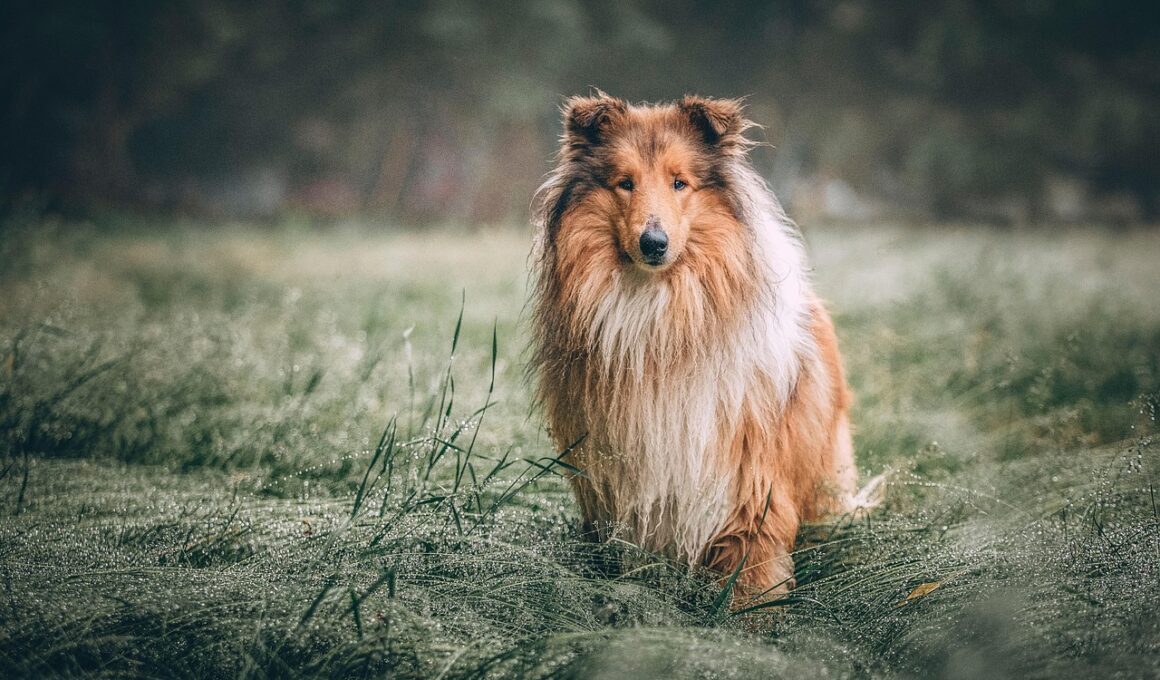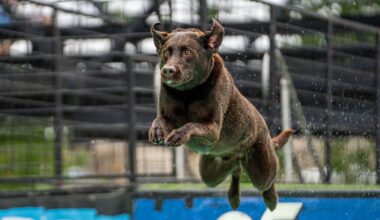The Psychology Behind Dog Socialization Challenges in Rural Settings
Socializing dogs in rural settings poses unique psychological challenges that can significantly impact their behavior and overall well-being. Unlike urban environments, rural areas can lack the constant exposure to diverse environments, other dogs, and various social stimuli. This limited exposure can affect a dog’s confidence and social skills, making them more anxious or territorial when encountering new experiences. In simple terms, the absence of regular interaction opportunities can lead to fear-based behaviors. Rural dog owners must actively seek opportunities for their pets to socialize positively to counteract these challenges. Frequently visiting dog parks, organized meet-ups, or even engaging with nearby neighbors and their pets can help overcome these limitations. Socialization at this early stage is critical for the dog’s development. For instance, meeting various breeds can help them understand how to interact positively and develop healthy habits. Furthermore, owners should focus on fostering a supportive environment, rewarding good behavior consistently. Utilizing positive reinforcement techniques can bolster a dog’s confidence when meeting other dogs, reinforcing positive actions during their encounters.
To effectively address the socialization challenges faced by dogs in rural areas, it’s crucial to understand the underlying psychology at play. Dogs are naturally social animals, and their well-being often depends on their ability to interact positively with others, both human and canine. In isolated environments, dogs may experience a lack of stimulation beyond their immediate surroundings. This can lead to boredom and behavioral issues such as constant barking, digging, or even aggression toward perceived intruders. Therefore, rural dog owners should consider developing a routine that incorporates frequent exercise and socialization endeavors into their dogs’ lives. Engaging walks, hiking, or playing with other dogs can significantly help alleviate anxiety and add necessary physical and mental stimulation. Local pet clubs or training classes can be beneficial. Connecting with like-minded individuals can create additional socialization opportunities for dogs. In these interactions, dogs learn proper canine communication, body language, and appropriate behaviors. It’s essential to consider these elements when fostering a nurturing environment to ensure the effective socialization of rural dogs. With time and effort, dogs will become more adaptable and friendly in both rural and more urbanized settings.
Understanding Fear in Dogs
Fear can be a pervasive emotion in dogs that significantly impacts their social behavior, especially in rural settings where encounters with new stimuli can be infrequent. Dogs raised in isolation may develop fear-based reactions when facing unfamiliar situations, people, or animals. These reactions can manifest as aggressive behaviors, submissive postures, or avoidance tactics. Understanding these fear responses is key to addressing socialization successfully. Owners must create an environment where their dogs feel safe and secure, which can reduce anxiety levels. Gradual exposure to various social settings allows dogs to build positive associations with new experiences. For instance, introducing them to different types of environments at their own pace can help them feel at ease. Positive reinforcement should accompany these introductions. Rewarding calm behavior encourages dogs to associate positive feelings with potentially scary situations. Moreover, identifying the triggers that induce fear and addressing those can be crucial. Incorporating specialized training and consulting with professional trainers can support them and their owners in navigating these challenges. Employing techniques tailored to individual dogs’ needs is essential to ensure successful socialization.
Another significant aspect of dog socialization in rural settings is the lack of structured activities available, which can limit opportunities for effective interaction. Urban areas often provide multiple dog-friendly spaces and meetups that facilitate socialization. In contrast, rural settings may demand a more creative approach from dog owners. In essence, community involvement can help create a network supporting local pet owners. Organizing informal gatherings or events such as dog shows can foster a sense of camaraderie among dog enthusiasts in the area while providing dogs with various exposure levels. Moreover, owners can actively seek out playdates with neighboring pets. Building relationships with neighbors who are dog owners opens doors to more social interaction opportunities. By engaging with other dogs and practicing self-control around each other, dogs can develop crucial social skills. Owners should remain observant during these social encounters, as they provide valuable insights into their dogs’ behavior. Regularly monitoring body language signals can help address any possible conflicts or apprehensions early, ensuring positive experiences. Therefore, creating a supportive community can significantly enhance the socialization experience of dogs.
The Role of Positive Reinforcement
Implementing positive reinforcement is a powerful tool for improving dog socialization techniques. It involves rewarding desired behavior rather than punishing unfavorable actions. This approach helps reinforce good behaviour and creates a more enjoyable atmosphere for dogs. In rural settings, where socialization opportunities may be limited, it’s vital to prioritize positive interactions between dogs and their environments. Encouraging playful behavior through toys, treats, or praise helps solidify positive experiences. When dogs approach unfamiliar situations with curiosity and ease, immediate rewards build a strong association between these encounters and pleasant outcomes. For example, friendly greetings to new dogs can be followed by treats, reinforcing calm behavior. Owners can observe how their dog reacts and adapt training sessions accordingly. Frequent training exercises, whether casual or structured, can greatly enhance their social adaptability. Additionally, it’s imperative that training sessions do not overwhelm dogs; gradually increasing exposure levels can help them feel comfortable. Over time, these techniques cultivate an environment for dogs that encourages inquisitiveness while reducing fears. Therefore, understanding and implementing these positive reinforcement techniques become vital components of effective socialization in rural areas.
Moreover, understanding the importance of consistency in socialization efforts cannot be understated. Dogs thrive in environments where they can predict outcomes based on their experiences. Inconsistency can lead to confusion and anxiety, making it critical for owners to establish a routine for socialization practices. Regularly scheduled outings to new areas or interactions with various other dogs can build dogs’ confidence over time. For instance, designating specific days to meet with friends and their pets helps establish an expectation which can reduce apprehension. Engaging in structured activities, like agility courses or obedience classes, can also provide focal points for improvement. This consistency not only helps dogs learn and adapt but also establishes trust between them and their owners. When dogs realize their owners provide consistent exposure to positive experiences, it fosters a sense of security. Additionally, maintaining such routines is also beneficial for the owner, encouraging a proactive approach to a dog’s socialization needs. Through systematic engagement and achievable goals, both can grow through mutual understanding. Over time, established routines can transform fear into curiosity, allowing dogs to thrive in various social scenarios.
Conclusion: Long-Term Benefits of Socialization
In conclusion, while socializing dogs in rural settings may present unique challenges, the long-term benefits significantly outweigh those challenges. Fully integrated socialization strategies foster well-adjusted dogs that maintain positive behaviors throughout their lives. As dogs become more adept at handling various situations, they develop better coping mechanisms, which empower them to approach numerous environments confidently. Positive interactions extend far beyond simple play; they encompass essential life skills that contribute to overall happiness. Dogs who are well-socialized tend to exhibit fewer behavioral problems, leading to harmonious living both for them and their owners. Furthermore, as dogs engage positively with the community, they strengthen the human-animal bond, enriching the lives of both parties. Additionally, dogs with strong social skills can participate in more community activities, from local dog shows to volunteer programs. Ultimately, these interactions deepen the shared experience of companionship, enriching the human-dog relationship. As rural dog owners invest in consistent socialization practices rooted in positivity and structure, a brighter future emerges for both dogs and their families. This commitment toward enhancing your dog’s social experience can lead to a happier and healthier companionship.
In summary, tackling the socialization hurdles of dogs in rural areas demands understanding, creativity, and commitment. Integrating structured practices and proactive engagement can significantly shape dogs’ behaviors, making them more adaptable citizens in society. It is crucial for owners to recognize their role in foster a supportive environment that uplifts their pets. Engaging in community efforts, seeking professional guidance, and embracing patience are vital components of this journey. Observable improvements will not only enhance a dog’s ability to interact socially but also allow owners to develop confidence in managing their pets. Together, as owners act together, fostering an inclusive, positive atmosphere, dogs will ideally flourish. Establishing regular socialization routines and implementing positive reinforcement techniques will encourage inquisitiveness in dogs while minimizing fear responses. This exploration into their surroundings will enhance both their physical and mental well-being. With a consistent approach, rural dog owners can create opportunities that eventually help dogs experience a rich and fulfilling life. The transformation, while gradual, yields benefits for both owners and their beloved companions.


